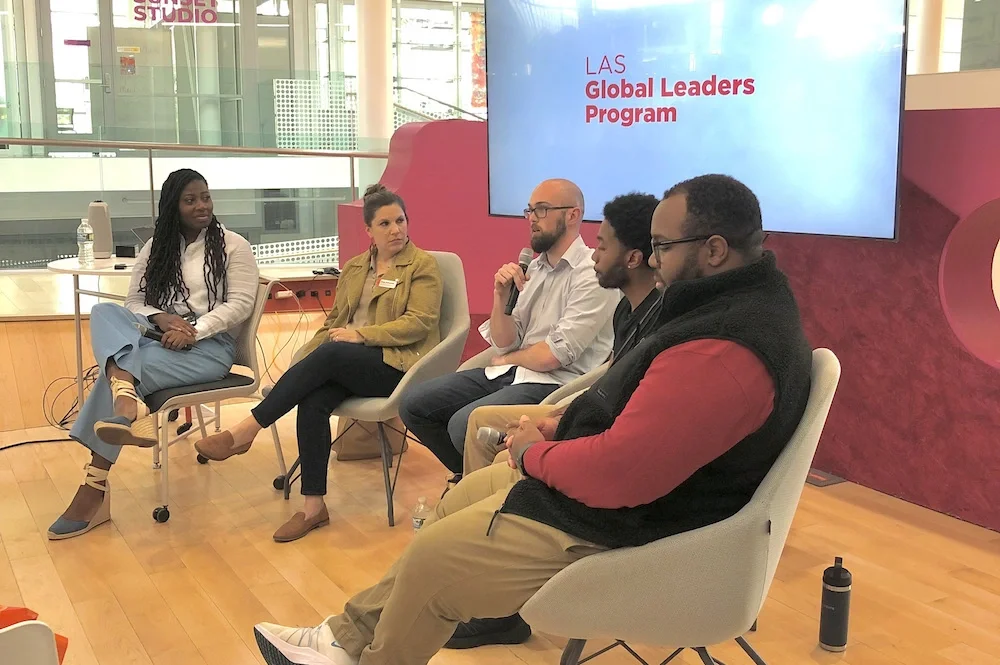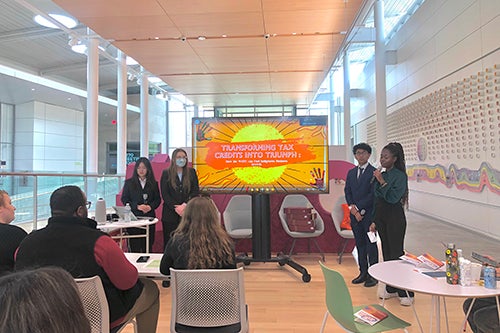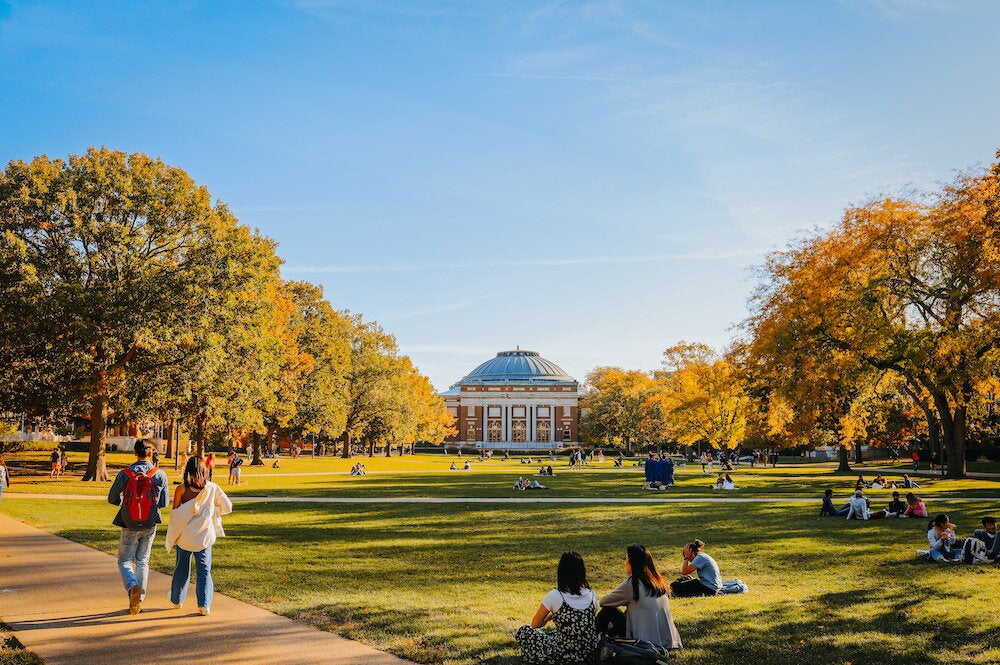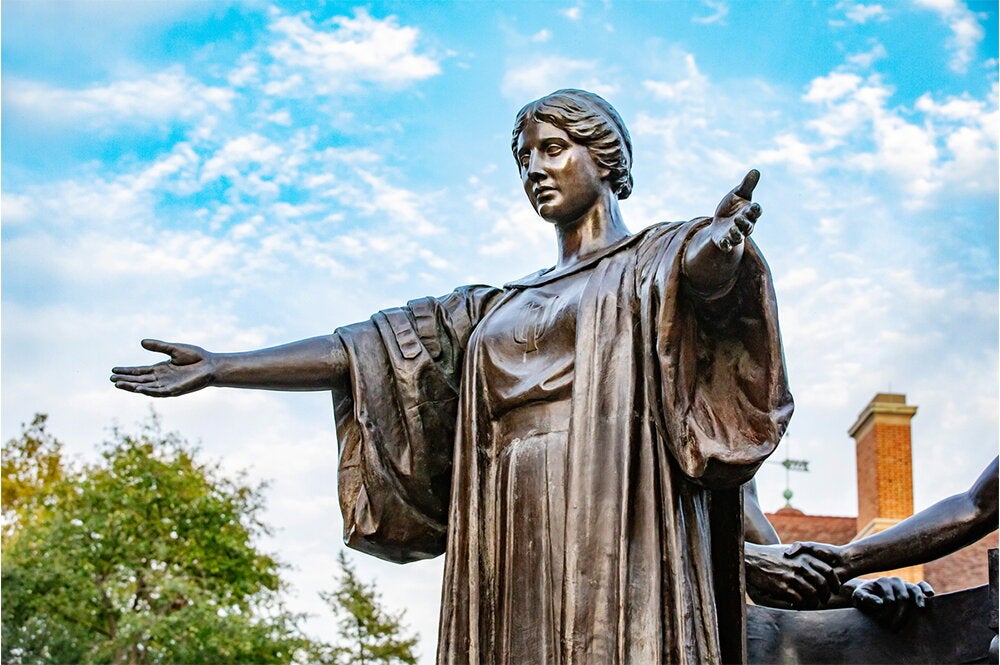
Cong Wang taught English in China for six years before arriving at the University of Illinois, but when she arrived on campus Wang knew that communicating isn’t just about proper spelling and grammar but also a grasp of the cultural nuances around the language. She still had a lot to learn about English to make the most of her time here as a student.
One of Wang’s personal philosophies, however, is that you learn things by doing them. So she joined the Center for Writing Studies Writers Workshop as a mentor and began helping other students with things she did know, such as proper citations and how to write expositional essays. Along the way she began to learn more about the language and the culture in America—and helped others do the same.
She recalled, for example, when another student from China asked her if he should bring a gift when he met with his professors. She explained that while it’s more common in China, it’s unusual in American universities.
Wang’s story is just one of many that describe how, lesson by lesson, international students find a new home at the U of I and the College of LAS. As of Fall 2023, there were 11,580 international students at the U of I, with 3,183 in the College of LAS, according to International Student and Scholar Services. Programs have been established in the college to help these students adjust to speaking and communicating in a place miles away from home.
The Center for Writing Studies Writers Workshop, located in the Main Library, gives students support in their writing from peer mentors, presentations, and writing groups. Carolyn Wisniewski, director of the Writers Workshop, said that 50% of the students who visit the Workshop are international students. In fall of 2023, the Workshop’s 29 consultants handled 2,954 sessions.
“The University of Illinois, being such a globally drawing campus, we certainly see a number of international students,” Wisniewski said. “We work with those students in a variety of ways.”
The Writers Workshop hires consultants every year to assist students, faculty, and staff with their writing needs. Some of the consultants, such as Wang, a PhD student in the College of Education, are international students who find that their perspective helps them engage with other international students who need help.

“You can't know everything, even if you want, but you can learn,” Wang said,
The English as a Second Language (ESL) program, hosted by the Department of Linguistics and headed by linguistics professor Randall Sadler and associate director and writing courses coordinator Susan Faivre, offers instruction on writing, speaking, pronunciation, and presentations.
The program serves 2,000 students per year, with half being undergraduate students and the other half being graduate students and faculty. The university asks that international students take English tests prior to arriving on campus, and the ESL program serves those whose proficiency scores indicate that they might need to improve their English to succeed as a student.
“It's about responsible admission,” Faivre said. “When you're admitting students whose first language is not the same as the language that they will be pursuing their academic career in, you want to make sure that those students not only can be successful in their academics but, also can be successful in campus life.”
She added: “It's very rewarding to work with these amazing students from all over the world. They're so talented and they go on to do great things all over, here and abroad. And to be a part of that, to be someone who supported them in some small way on their journey, is very meaningful.”
Other programs are focused on other aspects of adjusting to life on campus. Nikia Brown, associate director for intercultural and global learning, international student experience, creates connections with international students every day through her work within LAS International Programs.
“I grew up in a Caribbean household. My mom is from Jamaica and my dad is from Trinidad and Tobago. So, I grew up being exposed to those two cultures while living in the United States—Philadelphia specifically,” Brown said. “I've had to navigate intergenerational and intercultural experiences my entire life. And I feel like that definitely has kindled my passion for the work that I do.”
Brown’s LAS Global Leaders Program, launched in 2020, allows international students to take courses across a four-year program focused on creating connections with domestic students through meaningful engagement with local and international communities. The growing program currently has 63 students and helps students make campus and community connections.
“The students are from both domestic and international backgrounds; we intentionally mix them so they can work in a multicultural team setting and gain experience in problem solving social challenges collaboratively,” Brown said. “They learn how to come to understand different language backgrounds, work styles, and forms of communication.”
Assistance for non-native English speakers also comes through academic course offerings. Communication 101: Public Speaking focuses on strengthening students' ability to deliver speeches and learn about different aspects of successful communication when delivering content. There’s a subsidiary course as well: Communication 101: Public Speaking for Non-Native English Speakers.
The course is taught by lecturer Frank Gallo, assistant director of public speaking instruction in the Department of Communication. The international course helps students bridge cultural differences and encourages the integration of student's native languages with the course.
Gallo explained how one of the course materials was a video of someone explaining how to make Rice Krispie treats. Many international students, however, were confused and even grossed out by the video as the treats are not common outside of the United States. For the international speaking class, therefore, Gallo used a video about making tea.
After all, Gallo said, one main point of the course is to find connections between different cultures, not just to improve English skills. He recalled one assignment when students were asked to write a speech about a core value that they learned as a child. One student, Gallo recalled, when it was his turn, went to the front of the class and at first was very quiet.
“Then he just started talking in Arabic. Not that we even knew he could speak Arabic,” Gallo said. “That’s how he introduced himself to the class. Then he meticulously went into how that value was instilled in him, how he still lives by it, and encouraged us to live by it too. And it was memorable.”


